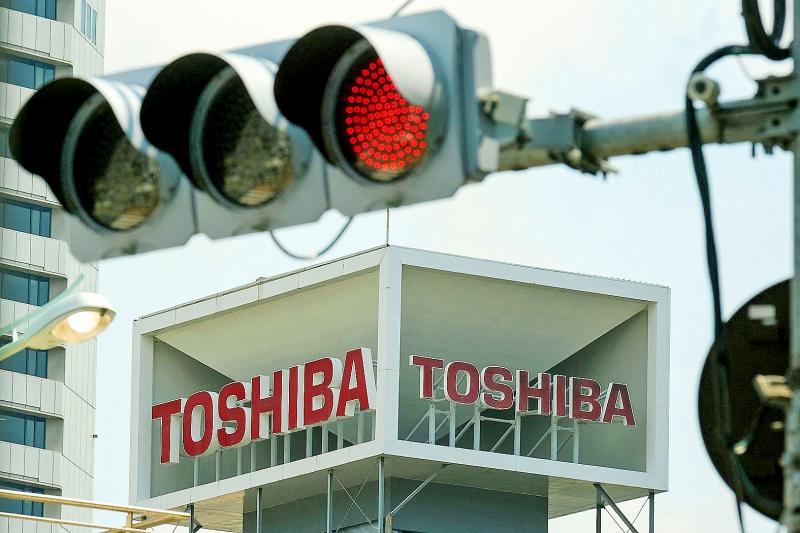Toshiba Corp said it received eight offers to buy out the conglomerate, as well as two proposals for capital and business alliances, as the Japanese industrial giant moved a step closer to a possible privatization.
The Tokyo-based company yesterday outlined the number of nonbinding offers received in a statement, without disclosing the bidders. It would evaluate the proposals, and choose one or more of them to pursue as soon as possible after the annual shareholders’ meeting scheduled for June 28.
Toshiba’s shares rose as much as 1.9 percent in Tokyo.

Photo: AFP
Toshiba last month said that it signed confidentiality agreements with 10 potential investors as part of its process to solicit proposals on privatization and strategic alternatives. The firm has been looking at other options after shareholders voted down a plan put forward by management to split the company in two.
Last week, Toshiba nominated a mergers and acquisitions veteran to chair its board, and picked two executives from its activist shareholders among its slate of director candidates, which would be voted on at the annual general meeting and then decide on the buyout offers.
Former Toshiba CEO Satoshi Tsunakawa, who opposed going private, would step down from the board.
Private equity investors including CVC Capital Partners, Blackstone Inc and Bain Capital were considering making bids. State-backed investment fund Japan Investment Corp was also mulling an offer, Bloomberg reported last month.
Toshiba would provide selected bidders with the opportunity to do due diligence from next month and ask them to submit legally binding proposals, it said in the statement.
Toshiba has been locked in a conflict with its shareholders over the future of the conglomerate, whose businesses range from semiconductors and quantum computing to nuclear power plants. Activist investors have been calling for the company to go private, a path that Toshiba’s management had been resisting before its proposal to split in two was voted down.
Analysts have said that the nuclear business, which is deemed important to Japan’s national security, is a major obstacle to any privatization.
A buyout of Toshiba, which has a market value of more than US$19 billion, could be private equity’s biggest ever deal in the country.
Separately on Thursday, Toshiba announced its management policy for the group, including a target of net sales of ¥5 trillion (US$38.5 billion) and ¥600 billion in operating income in fiscal 2030.

SEEKING CLARITY: Washington should not adopt measures that create uncertainties for ‘existing semiconductor investments,’ TSMC said referring to its US$165 billion in the US Taiwan Semiconductor Manufacturing Co (TSMC, 台積電) told the US that any future tariffs on Taiwanese semiconductors could reduce demand for chips and derail its pledge to increase its investment in Arizona. “New import restrictions could jeopardize current US leadership in the competitive technology industry and create uncertainties for many committed semiconductor capital projects in the US, including TSMC Arizona’s significant investment plan in Phoenix,” the chipmaker wrote in a letter to the US Department of Commerce. TSMC issued the warning in response to a solicitation for comments by the department on a possible tariff on semiconductor imports by US President Donald Trump’s

‘FAILED EXPORT CONTROLS’: Jensen Huang said that Washington should maximize the speed of AI diffusion, because not doing so would give competitors an advantage Nvidia Corp cofounder and chief executive officer Jensen Huang (黃仁勳) yesterday criticized the US government’s restrictions on exports of artificial intelligence (AI) chips to China, saying that the policy was a failure and would only spur China to accelerate AI development. The export controls gave China the spirit, motivation and government support to accelerate AI development, Huang told reporters at the Computex trade show in Taipei. The competition in China is already intense, given its strong software capabilities, extensive technology ecosystems and work efficiency, he said. “All in all, the export controls were a failure. The facts would suggest it,” he said. “The US

The government has launched a three-pronged strategy to attract local and international talent, aiming to position Taiwan as a new global hub following Nvidia Corp’s announcement that it has chosen Taipei as the site of its Taiwan headquarters. Nvidia cofounder and CEO Jensen Huang (黃仁勳) on Monday last week announced during his keynote speech at the Computex trade show in Taipei that the Nvidia Constellation, the company’s planned Taiwan headquarters, would be located in the Beitou-Shilin Technology Park (北投士林科技園區) in Taipei. Huang’s decision to establish a base in Taiwan is “primarily due to Taiwan’s talent pool and its strength in the semiconductor

French President Emmanuel Macron has expressed gratitude to Hon Hai Precision Industry Co (鴻海精密) for its plan to invest approximately 250 million euros (US$278 million) in a joint venture in France focused on the semiconductor and space industries. On his official X account on Tuesday, Macron thanked Hon Hai, also known globally as Foxconn Technology Group (富士康科技集團), for its investment projects announced at Choose France, a flagship economic summit held on Monday to attract foreign investment. In the post, Macron included a GIF displaying the national flag of the Republic of China (Taiwan), as he did for other foreign investors, including China-based